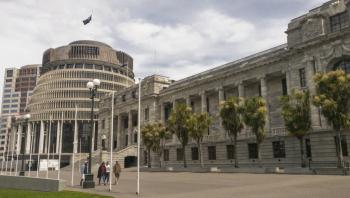Programme overview
Develop the skills for a career as a Civil Engineer in this three year (full-time) Bachelor’s programme. Specialise in environmental, geotechnical, water, roading and transportation, or structural engineering. Learn to make informed decisions about civil engineering projects, and apply technology to solve practical engineering problems. Explore computer-modelling techniques, civil engineering project management, engineering materials and structures, and construction practices.
There are 4 pathways within the Civil major:
Structural engineering: design, construction, and supervision of buildings and other structures
Water engineering: design and construction of water supply, wastewater or stormwater systems, analyse river catchment systems, hydrology and erosion management, and urban drainage systems
Geotechnical engineering: analysis, design and construction of foundations, slopes, earthworks structures and retaining walls
Roading and transportation engineering: design, construction and maintenance of roads, traffic engineering and urban transportation studies.
Highlights
- Get qualified in 3 years (full-time) and into employment sooner.
- A nationally-recognised engineering qualification.
- Approved under a New Zealand-wide framework for three-year engineering degrees
- Accredited by Engineering New Zealand. On completion of this programme, combined with a period of work experience, you'll be eligible to apply for membership of Engineering New Zealand.
- Internationally recognised under the Sydney Accord
- Five different pathways: environmental, geotechnical, water, roading and transportation, or structural
- Strong links with the engineering industry
- Small classes: the average class size is just 35-60 students
- Cross-credits from the New Zealand Diploma in Engineering (Civil) available
Qualification pathway
Well-prepared students have the best chance of success in their studies, so we've put together a free online guide you can use to refresh and sharpen some of the skills you'll need in this programme
Cross-credits from the New Zealand Diploma in Engineering (Civil) are available.
If English is not your first language, please be aware that to enter this programme you'll need to have achieved at least one English proficiency outcome in the last two years, such as IELTS. This applies to both new students and progressing students (including NZDE graduates).
Admission requirements
What you will need to study this programme.
Domestic students
International students
Academic requirements
As a part of this requirement, you must be at least 16 years of age and meet one of the below;
- Successful completion of New Zealand Diploma in Engineering (Civil)
- All applicants must be at least 16 years of age when they begin their studies, and they should meet the country-specific admission requirement;
And English entry requirements;
If English is not your first language, you will also need at least one of the following qualifications:
- Evidence of an IELTS (Academic) band score of at least 6 with writing and speaking scores no less than 6.0 and reading and listening bands no less than 5.5 or
- University Entrance Literacy: 10 credits at Level 2 or above in English or Māori (5 in Reading, 5 in Writing) or
- Evidence of English language proficiency as outlined in the NZQA Rules on the Unitec English Language Requirements for International Students Web-page.
Don’t meet these Academic requirements?
- If you don’t meet the academic criteria, our Bridging Education Programmes can help you qualify. Simply apply online, and we’ll discuss your next steps.
- If you don’t meet the above criteria, special or discretionary admission may apply; your eligibility will be determined at the interview.
For more information, download the programme regulations (PDF 552 KB)
Courses and timetables
For more details on the courses including timetables, please click on the course names below.
| Courses | Credits | Aim |
|---|---|---|
| Engineering Computing (ENGGMG5001) | 15 credits (0.125 EFTS) | To enable students to develop an understanding of computing principles and their use in engineering practice. |
| Mechanics (ENGGMG5002) | 15 credits (0.125 EFTS) | To enable students to gain an understanding of the fundamental principles and laws of mechanics. |
| Engineering Communication (ENGGMG5003) | 15 credits (0.125 EFTS) | To enable students to communicate effectively in their professional environment. |
| Engineering Maths Level 5 (ENGGMG5004) | 15 credits (0.125 EFTS) | To enable students to gain an understanding of general mathematical principles and equip them with appropriate engineering mathematical skills to solve engineering problems. |
| Engineering Design and Drawing (ENGGMG5005) | 15 credits (0.125 EFTS) | To enable students to gain an understanding of engineering design, drawing practice and modelling in an applied context. |
| Land Surveying (ENGGMG5006) | 15.0 credits (0.125 EFTS) | To enable students to gain introductory theoretical and practical concepts of land surveying. |
| Fluid Mechanics (Civil) (ENGGMG5008) | 15 credits (0.125 EFTS) | To introduce the principles of fluid mechanics and apply them in civil engineering hydraulic applications |
| Geotechnical Engineering 1 (ENGGMG5009) | 15 credits (0.125 EFTS) | To introduce the fundamentals of soil composition, the engineering properties of soils, and site investigation procedures. |
| Highway Engineering (ENGGMG5012) | 15 credits (0.125 EFTS) | To introduce the fundamentals of road materials, road construction practices, principles of drainage design, and basic geometrical alignment of a road. |
| Structures 1 (ENGGMG5032) | 15 credits (0.125 EFTS) | To enable students to analyse structural elements and simple structures, and to design simple beams. |
| Civil Materials (ENGGMG5107) | 15 credits (0.125 EFTS) | To enable students to learn the fundamentals of geological and geomorphological processes and the properties and application of a range of civil engineering materials |




